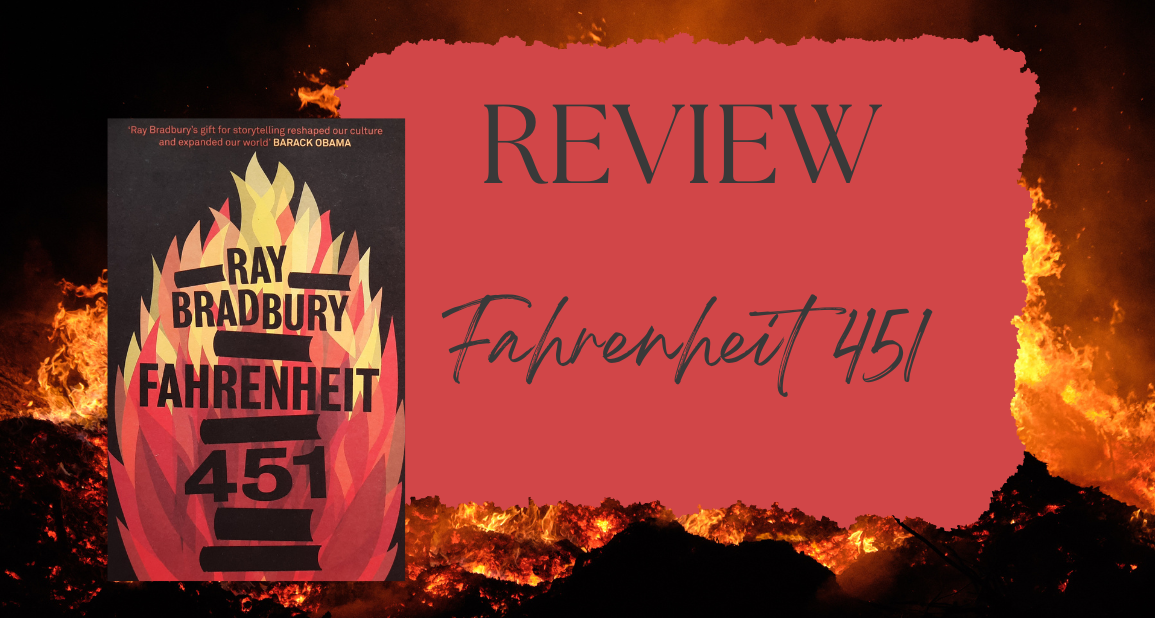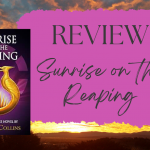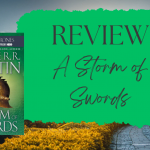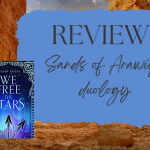Review | Fahrenheit 451

Summary: Guy Montag serves as a fireman. Only that his job is not to extinguish fires, but to start them. More precisely, his job is to burn books. Books are seen as dangerous, a source of unhappiness. He never questioned what he was doing, until one day he meets Clarisse McClellan, a young girl, who opens him a new perspective on the world. Suddenly he wonders if burning books is truly a good practice. He even goes as far as being intrigued by their contents. A curiosity that might threaten his life.
Review
Everyone who knows me, knows that I love reading dystopian fiction ever since falling in love with The Hunger Games. Therefore, after quite a while reading exclusively other genres, I decided to return to dystopian fiction and read some of it classics. Fahrenheit 451 sounded especially intriguing with its society where books are burnt, the worst nightmare of any reader. It didn’t disappoint!
The novel was quite short (only about 200 pages) but its pages were packed with so many thoughts that it could have filled many more pages. What I really liked about Bradbury’s storytellling was that it didn’t drag events out unnecessarily and didn’t spend much time explaining to the reader, the reader has to make sense of the events themselves. Not in a manner where everything is confusing and you have no idea what is going on, but in a way that the author doesn’t tell you what to think and goes into detail about everything that happens and the reasons behind it. There are a lot of things that are barely touched upon but that allow the reader, through their mention, to understand more dimensions of the world Bradbury created.
All in all, the world was fascinating and terrifying at the same time. Regarding the fact that the novel was written more than fifty years ago, some depictions are scarily accurate of today’s world. Such as the virtual world increasingly gaining importance and leading to the neglect of the actual world and mindless entertainment being a part of daily life. Luckily, it hasn’t yet reached the extreme level we see in the novel and the bookcommunity proves that people are still very much interested in literature but the future hasn’t been written yet so who knows where we will end up? (Not in Fahrenheit 451, I believe, but certain parallels are there)
What made the world of Fahrenheit 451 so terrifying to me was one key difference to other dystopias I have read to far. It wasn’t about a tyrannical government keeping the people in fear and hindering them from living the life they want to have. That was certainly part of it but far less prominent than something else. The people slowly giving up on their free thoughts themselves, not reflecting on their surroundings anymore, not being touched by anything that doesn’t happen to them, being satisfied as long as they are surrounded by their screens with virtual people talking to them (Bradbury calls them the “family” in the novel) and most of them seeing nothing wrong with their lifestyle.
Of course there was also the dimension of people being discouraged to think on their own, people’s houses being burnt for possessing books and people being persecuted for being against the current system. But seeing as many people not only didn’t show their dismay about the system openly to protect themselves, but didn’t feel negatively about it in the first place, to me was more terrifying.
Another aspect I really liked about the book was the importance of books in the story. As a reader, burning books is a nightmare, that much is obvious. But the most interesting part was the discussion about the importance of books in society and also why books were banned in Bradbury’s world. It definitely opened me some new perspectives on how I view books.
All in all, there were a lot of political themes discussed and the novel focused a lot on social commentary (which most dystopian novels do), mainly about the goals a society should have, what is and what can be important in life and if reflecting on the world and one’s surroundings is one of these things.
The book also carried a lot of symbolism with many of the depicted events having a function that goes beyong moving the story forward and instead opens another dimension to the world.
But while there were a lot of positive things on the theoretical level, I still had one problem with the book. It may have been due to the focus on the social commentary and probably had to do with the length of the novel (which was, as mentioned earlier, quite short) but I couldn’t really connect to the characters. Not all of the characters had their happy ending, some did and of some we don’t know. But I wasn’t invested enough to actually feel for the characters. From a logical perspective, I was able to see the events from their point of view and imagine their emotions, but I couldn’t feel them. That’s the reason I gave this book only 4.5 stars instead of 5.
In conclusion, I can definitely recommend this book to any readers who are into dystopian fiction or want to read a novel that focuses a lot on politics and social commentary.
IMPORTANT NOTE: If you haven’t read this book yet and have the same edition as I have (to be seen at the top of the post) please be aware that the introduction contains some spoilers for the story. Therefore, I recommend to read the novel first and the introduction after finishing the actual novel.
Things to consider before reading:
There wasn’t an abundance of triggering topics but there was quite some violence discussed in the book, including death, which some people might not want to read about. Other than that, I can’t remember anything that stood out to me as potentially triggering.
Disclaimer: This should serve solely as a guide when deciding whether or not to read this book. I cannot guarantee that this list is complete. If you are triggered by something or want to avoid certain topics, please make sure to double check.
Feel free to share your opinion on the book in the comments. I would love to hear what you think about it and whether you liked it!
Please remember to keep the comments spoiler-free or add a Spoiler Alert beforehand so everyone has the opportunity to enjoy the reading experience without already knowing everything that happens.




One thought on “Review | Fahrenheit 451”